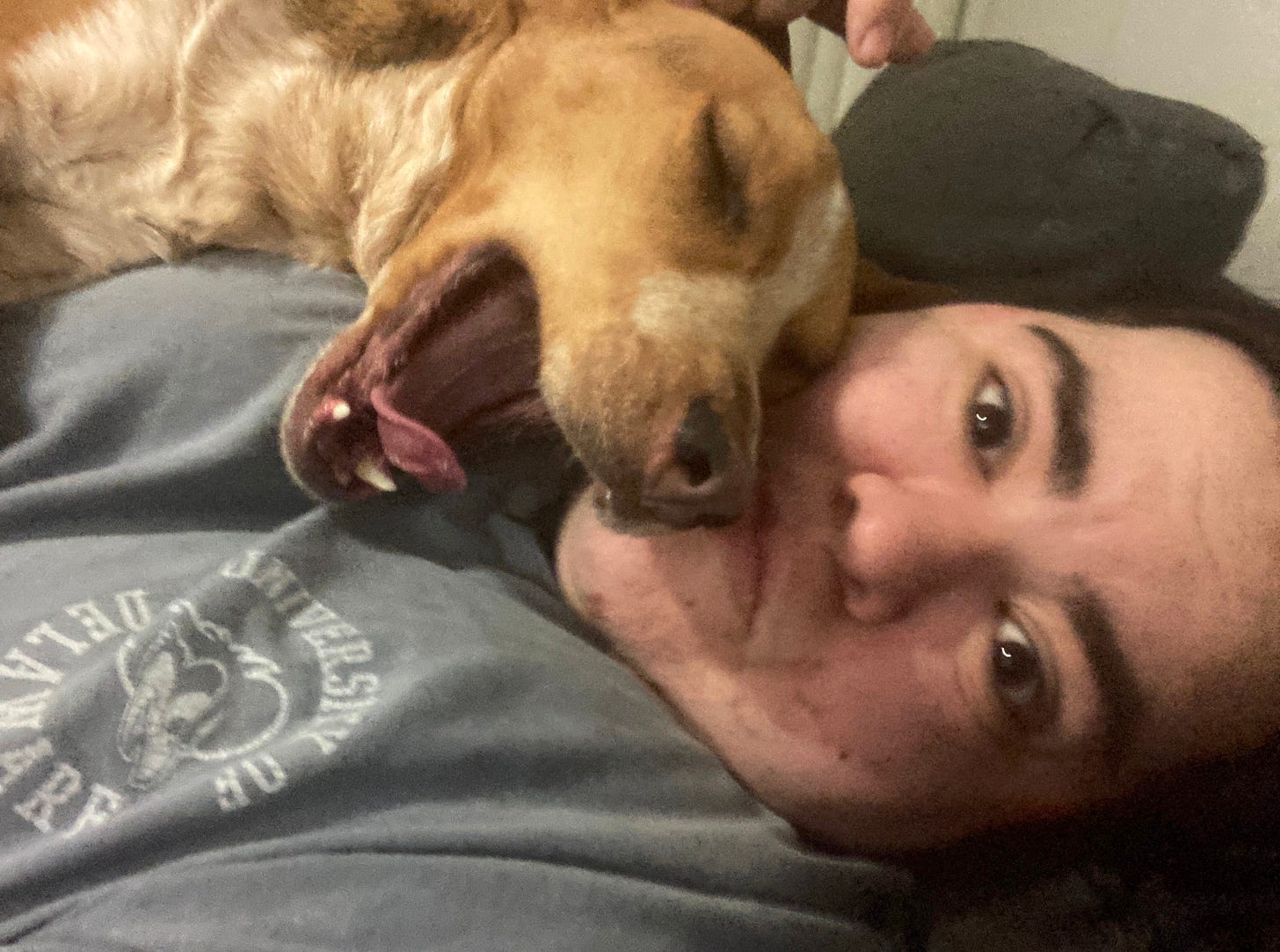Vulnerability and Dependability
What's a girl to do?
When I started this Substack (blogs are out, newsletters are in), it was motivated by the absolute gift that my beagle Rocco has been in my life. He’s a silly, goofy, little dog that is mainly motivated by his sense of smell, and when I look at him and his foolishness, I get a glimpse of how God must look at us.
.Truthfully, I got Rocco at one of the lowest points of my journey. He was a last-ditch effort to get some relief, to quiet the voices in my head and turn down my hypervigiliance, the deep-rooted fear that I was constantly in danger. With Rocco, I hoped, I could finally get some rest and start moving forward.
Now, Rocco didn’t heal me completely, but he did get me out of the house, talking to neighbors, and thinking about something other than myself. Every night when I get home from work, I look forward to chasing him (and his brother, Noli) around our home.
Rocco also gave me a framework for talking about my mental health and, more particularly, my mental illness.
There’s also certain things that I have not shared, or have held back on, because I am afraid of the stigma they contain. I want to be a professional, someone who is looked upon for dependable results, and I’m afraid that if people really knew what the day-to-day was like for me, their opinions of me would change. Especially as someone who works full-time, I am much more inclined to push for people to say, “Wow, how does she do it?” rather than admit that I’m drowning and could never really do it at all.
There are two different thing? ideas? frameworks? that have helped me.
The first is Dialectical Behavioral Therapy (DBT), a therapeutic model created by Marsha Linehan that has been proven especially effective to reduce suicidality and self-harm in people experiencing acute mental health crises. It’s also been proven to be effective as ongoing treatment for borderline personality disorder. I came to learn DBT skills through an outpatient treatment program I went through and it has gotten me through some of the darkest, genuinely insane moments of my life.
The basis of DBT is the concept of the dialectic: that two seemingly opposing things can be true at the same time. A great example for someone who has experienced trauma like me would be: it is possible to both feel unsafe and be safe at the same time. Just because I feel like someone might be sneaking up behind me doesn’t mean that they actually are.
It’s important here not to discount either part: to recognize that I feel unsafe, not because I am in danger right now, but because something happened in the past. There is a wound there that the Lord desires to heal and just shoving it down won’t do anything. At the same time, just because I am safe in reality does not mean that fight or flight instinct needs to be thrown out altogether— I need it to keep me safe from actual dangers.
Similarly, being vulnerable and being dependable seem to be two opposing ideas to me. An increase in vulnerablity necessitates a decrease in dependability. But is that really true?
Sure, for some they might find out that I have PTSD or, something I have slowly been sharing more about, that I have DID (dissociative identity disorder, formerly known as multiple personality disorder) and decide they can’t depend on me. But that’s not necessarily true.
The second framework that has helped me with this is Brené Brown’s research on vulnerability.1
In Brené Brown’s work, it is clear that vulnerability is true courage, that there is no success in life without vulnerability because we will always be stuck in what we know, never venturing to see what would happen if we try something different.
Vulnerability is sending a pitch to an editor with a story idea that’s extremely important to the writer. Vulnerability is texting a friend you haven’t heard from in a while and saying you miss them. Vulnerability is sharing what it’s like to try to be faithful to Christ when your mind is constantly betraying you in the hopes that it might help someone else.
Now, there are always things that I will hold back that are between me and my therapist or me and Jesus. Some things I share with a small group of people who I’ve learned I can trust. As Brown says, vulnerability without trust, or indiscriminately sharing private information, is not vulnerability at all. Vulnerability involves a relationship, and a moment of vulnerability can be a defining factor in the future of that relationship.
Friends, I cannot think about a more vulnerable moment than our Lord on the Cross, carrying the weight of our sins, crying out, “My God, why have you abandoned me?”
The Lord was vulnerable, being willing to be put to death for you and for me, and because of that we know that we can depend upon Him.
In His vulnerability, he has given up everything, knowing that we can — and that some do — reject him. And it’s precisely because of that length that He has gone to that we can look upon a crucifix or an empty Cross and know that we are worth dying for.
As you probably know, I’m just now getting back into the newsletter swing of things. I hope that these newsletters are edifying for you, and I thank you for giving me the opportunity and the space to work through some of my thoughts as I prepare for bigger projects.
Please consider becoming a paid subscriber to show support for the work that I’m doing here and share it with your friends and family. Paid subscribers get an exclusive media review newsletter every Friday.
Last week I reviewed “Defying Gravity,” and this week I’ll be writing about Conclave (the book). You don’t want to miss it.
I would recommend “Braving the Wilderness: The Quest for True Belonging and the Courage to Stand Alone” (2017) and “Daring Greatly: How the Courage to Be Vulnerable Transforms the Way We Live, Love, Parent and Lead” (2012) or Brown’s Netflix special, “The Call to Courage” (2019).





This is beautiful, Cici!
Great post. Very brave. Faith in Jesus is what guides us through the valleys show that we can see his beauty and holiness on the other side. I love Brene Brown and have found her work wonderful. Just know that prayers are going up for you from Tanzania!